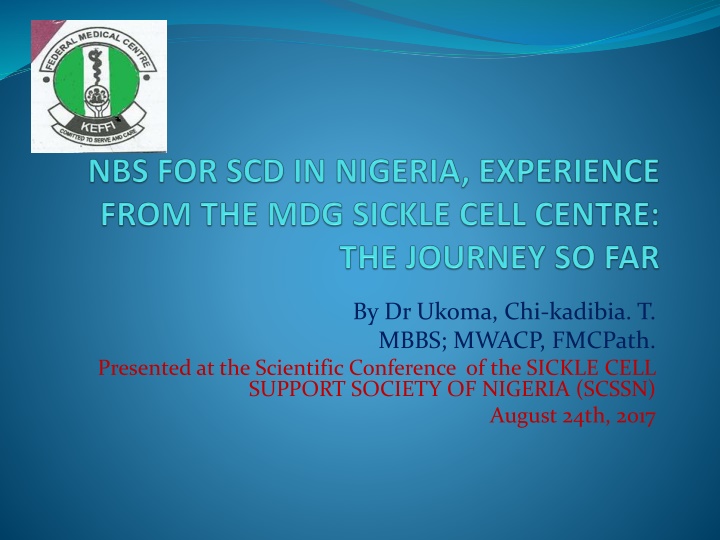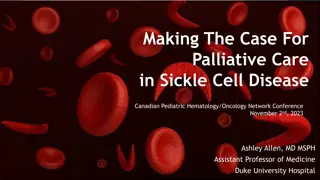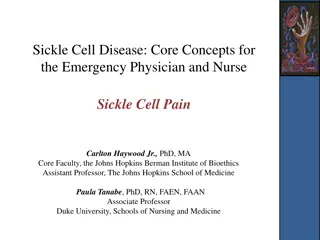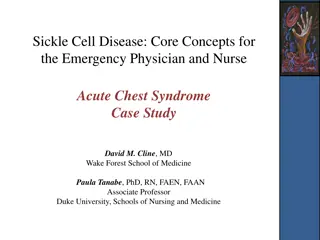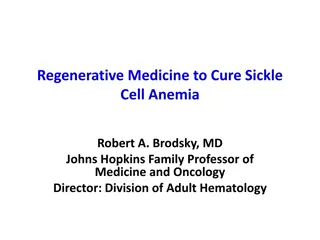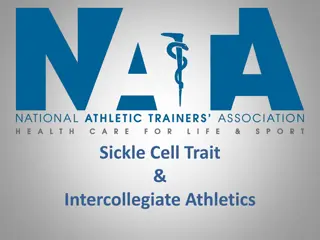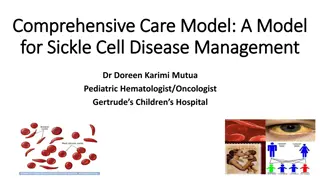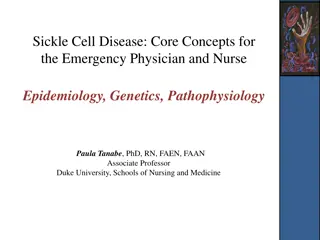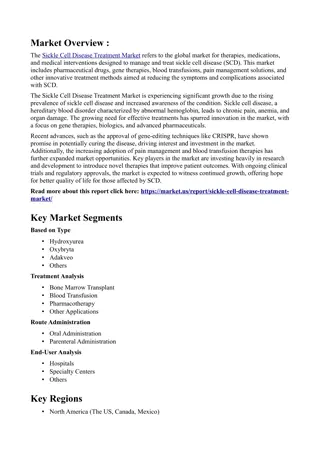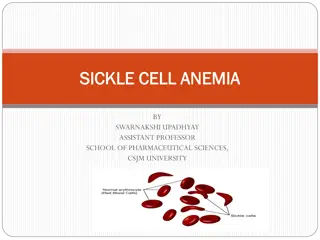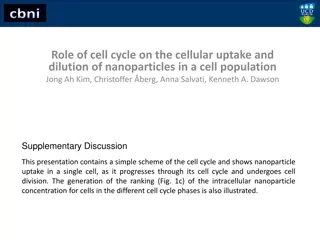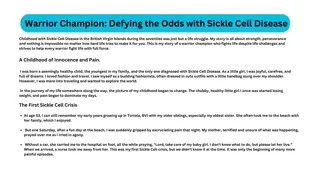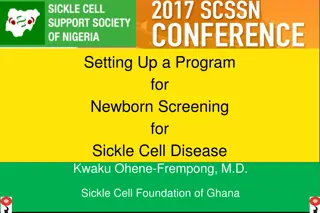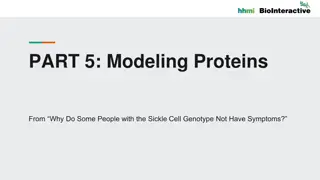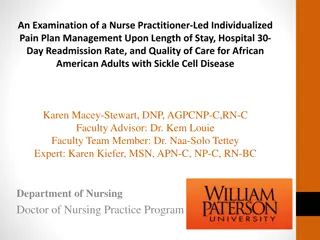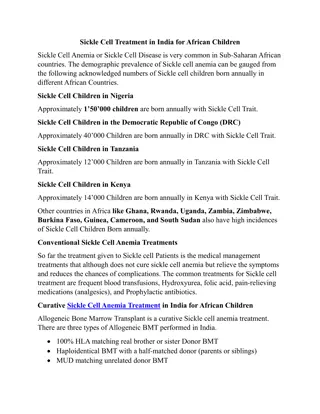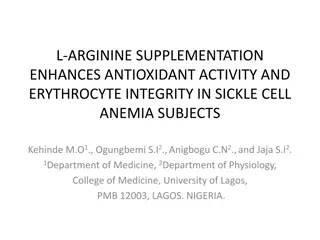Sickle Cell Disease in Nigeria: Urgent Attention Needed
Sickle Cell Disease (SCD) poses a significant burden in Nigeria, with high mortality rates and various associated challenges. This presentation highlights the need for urgent attention to address stigmatization, discrimination, and access to proper treatment. The Federal Ministry of Health's initiatives and the importance of Newborn Screening in improving survival rates are discussed. The document also emphasizes the heavy impact of SCD on both health and socio-economic aspects of individuals and the region.
Download Presentation

Please find below an Image/Link to download the presentation.
The content on the website is provided AS IS for your information and personal use only. It may not be sold, licensed, or shared on other websites without obtaining consent from the author.If you encounter any issues during the download, it is possible that the publisher has removed the file from their server.
You are allowed to download the files provided on this website for personal or commercial use, subject to the condition that they are used lawfully. All files are the property of their respective owners.
The content on the website is provided AS IS for your information and personal use only. It may not be sold, licensed, or shared on other websites without obtaining consent from the author.
E N D
Presentation Transcript
By Dr Ukoma, Chi-kadibia. T. MBBS; MWACP, FMCPath. Presented at the Scientific Conference of the SICKLE CELL SUPPORT SOCIETY OF NIGERIA (SCSSN) August 24th, 2017
FEDERAL REPUBLIC OF NIGERIA FEDERAL MINISTRY OF HEALTH FINAL DRAFT NATIONALGUIDELINE FOR THE CONTROL AND MANAGEMENT OF SICKLE CELL DISORDER(SCD) 3/11/2012 This guideline shall be updated periodically. Comments and suggestions concerning its contents are encouraged and should be sent to: Department of Public Health, Non-Communicable Disease Control (NCD) Programme, Federal Ministry of Health, Federal Secretariat, Phase 3, Maitama, Abuja. Tel. +2348033077643, +234802437445, +2348023618439 Email: ncdprevention@hotmail.com
. Other associated problems include stigmatization, job discrimination, illness related absenteeism from schools or workplace, stunting and failure to thrive in children, poverty related inaccessibility to standard treatment, frequent blood transfusion, depression and other psychosocial challenges. The foregoing certainly demand serious and urgent attention, in response to which the FMOH in collaboration with MDG office have empowered 4 medical centers in Nigeria, located in Abakaliki, Ebute-Metta, Gombe and Keffi, to run dedicated clinics and programmes for the management and control of SCD. Prof. Onyebuchi C. Chukwu Former Honorable Minister of Health Preface to the National Guideline on SCD
Introduction Sickle Cell Disease (SCD) is one of the most common genetic diseases associated with severe morbidity and mortality. Africa contributes 75% of the world s SCD population with a heavy burden on the health and socio-economic life of individuals and the region. Newborn screening (NBS) for SCD has been recommended as an effective intervention to improve survival.
Introduction-2 Rank topmost in the world, about 34.8% 75% of all SCD births in Africa. Prevalent rate of 24% of sickle cell trait SCD is said to affect 2-3% of the Nigerian population Estimate btw 91, 000 -150,000 babies born with SCD-SS About 100,000 dying annually before 5th birthday
Background & Problem Statement 50-90% of affected kids die before 5years (Makani et al 2011;Rees et al 2010;Serjeant 2005;Williams et al 2011) .
Newborn Screening can reverse this trend!!! A reduction in incidence of pneumococcal sepsis by 84%[Gatson et al 1986] A reduction in SCD mortality from 15-30% to <1%[Griffiths et al 1988;Nussbaum et al 1984] 99% chance of living at least 16years[Telfer et al, 2007]. As low as 5% is achievable in low-resource settings. [Piel et al 2013]
Background Federal Medical Centre Keffi is a 217-Bed Tertiary Hospital Located in Nasarawa state(North Central Region) Named in 2011 as one of the first 4 SCD special centres under the auspices of MDG/FMOH Others are MDG supported SCD Center, Federal Medical Center, Abakaliki. MDG supported SCD Center, Federal Medical Center, Gombe. MDG supported SCD Center, Federal Medical Center, Ebute- Metta. 2 new centres have been added (2012) MDG supported SCD Center, Federal Medical Center, Birnin-Kebbi. MDG supported SCD Center, Federal Medical Center, Yenagoa
The Journey so far 2011 Designated Centre for SCD Neonatal Screening in the North Central region. SCD project Set up Take off grant with purchase of Vnbs HPLC and kits Coordinator appointed Training of key focal persons and counselors
2013 Commencement of the newborn screening in April Full activation of the SCD Centre for daily use Collaboration with SCD NGOs and groups such as the Sickle Cell Support Society of Nigeria (formerly Nigerian Sickle Cell Disease Network) Participated in the 2013 World Sickle cell day celebration and hosted the training workshop for participant from all over the country Samples received and analyzed 39 Initially only 6 results could be authenticated 36 results and 3 Not determined
Results of first test run of Vnb HPLC Neonatal SCD Screening at FMC Keffi 2013 Total no of samples collected Sample analyzed Total no of samples authenticated 35 Hb AA (FA) 30 Hb AS 6 Hb SS 0 Non valid results 3 76 39
2014 Organized a 5-day training by Experts from Guys & St Thomas Hospital London under the auspices of Sickle Cell Cohort Research (SCORE), August 11-15, 2014 Sample received - 252 Sample analysed 115 Results 69 Not released not authenticated No Haematologist in the centre Problem noted: poor elution from aged samples making result interpretation difficult
2014 test results after training and re-run FA/AF - 161 FAS/ASF/AFS - 43 FS - 1 SFA - 1 FAC/AFC 3 FAD - 1 ND - 4
2015 NO ACTIVITIES
2016 Training of 3 Laboratory Scientists and 3 Doctors by Biorad NBS resumed in October Sample received 78 Sample analyzed - 77 FAS 19 AFS 5 SFA - 1 AS - 1 FA - 41 A/AA 8 FAD 1 FAC 1 FS - 0
2017 ASH VTP for a consultant Haematologist at SCP MUHAS, Tanzania Collaboration with FMC Asaba and UATH Gwagwalada Sample screened 874 FMC Keffi 84 FMC Asaba 692 UATH - 96
NBS in FMC Keffi from 2013-2017 YEAR TOTAL NBS HB-AA HB-AS HB-SS HB-AC HB-AD ND HBS/B*Thal 2013 39 30 6 0 0 0 3 0 2014 215 161 45 1 3 1 4 1 2015 0 0 0 0 0 0 0 0 2016 77 51 24 0 1 1 0 1 2017 84 66 17 0 0 1 0 0 TOTAL 415 308 92 1 4 3 7 2
Summary of NBS from 2013 -2017 Total sample received and screened 1203 FMC Asaba 692 (57.52%) UATH Gwagwalada 96 (7.98%) FMC Keffi NBS 415 (34.50%) 522 sample received HbSS identified -1 (0.24%) HbAS carrier state 90 (21.69%) Hb S/ + thalassaemia traits (SFA) 2 (0.48%) Other Abnormal Hb traits - 7 HbAC 4 (0.96%) HbAD 3 (0.72%)
Statement of fact NBS for SCD can reduce the burden of SCD in Nigeria No co-ordinated national NBS for SCD going on in Nigeria Government have produced a policy document and guideline for SCD and NBS Government have build and equipped 6 centres for dedicated SCD mgt and NBS The structures and facilities are decaying away in some centers
Pertinent Questions Why can t we make NBS work in Nigeria? Was NBS actually designed for free for service? Can the program be sustained on free for service ? Is it possible to recoup some percentage of the cost from the clients ? added to the delivery fee?? How do we get the funds to run the program? Should we advocate for a change to point of care tests like the Sickle scan
A focal person at all levels (Ward, LGAs, State and Federal) and within the health facilities should be responsible for advocacy and community mobilization for NBS. Who is supposed to appoint these focal persons? Who is supposed to provide the logistics?
